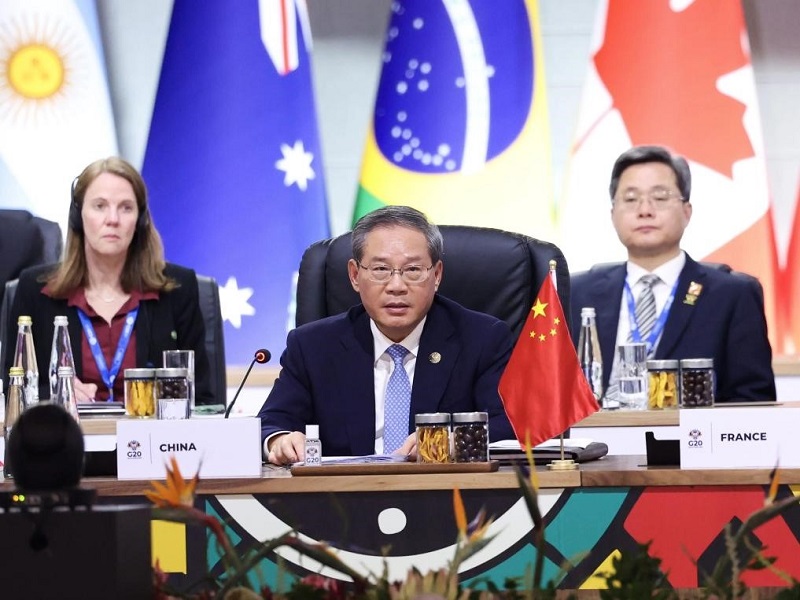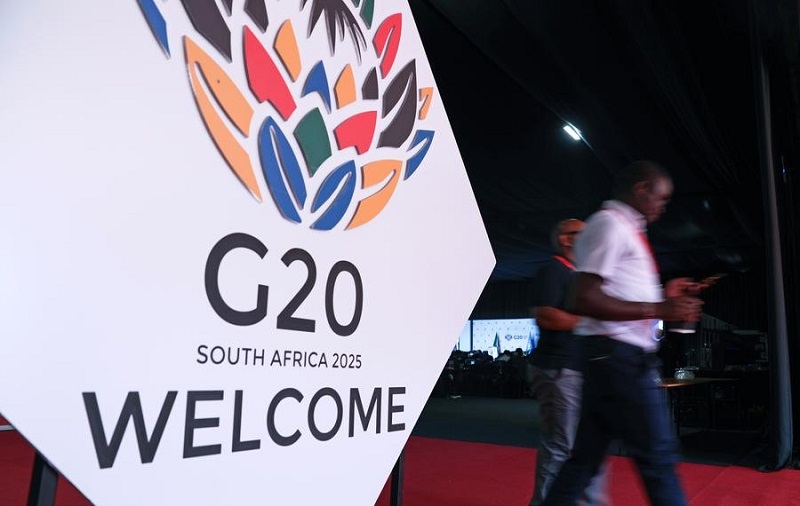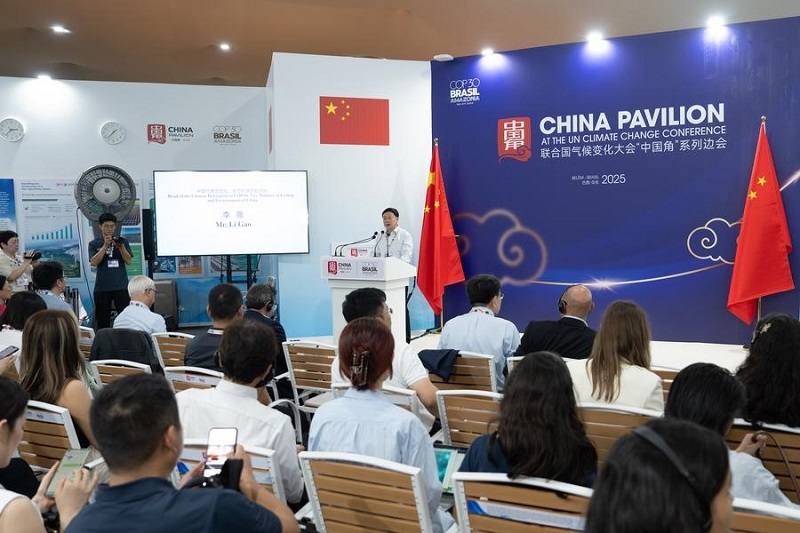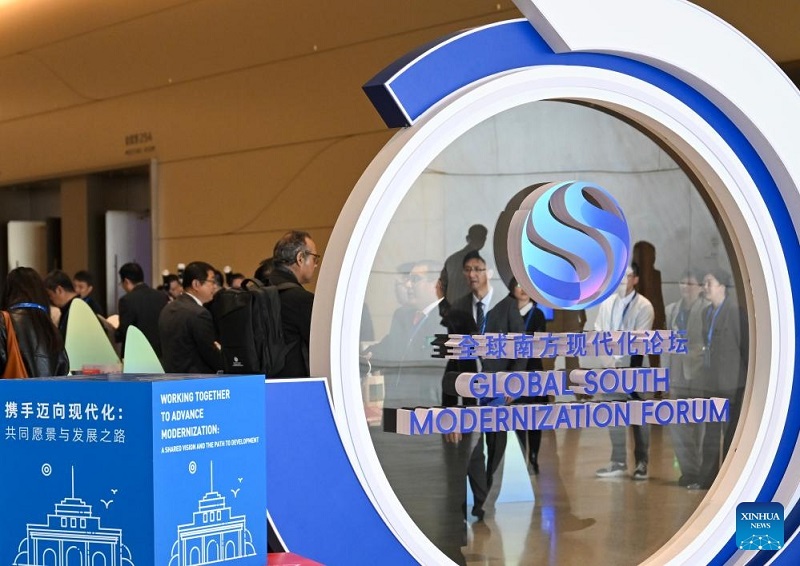As the world navigates a period of profound geopolitical and economic realignment, the recently unveiled Recommendations for China’s 15th Five-Year Plan (2026-2030) offer a timely and resolute vision. At its core lies a commitment to promote high-standard opening up and break new ground in pursuing win-win outcomes, and to advance the building of a community with a shared future for humanity. This is not mere rhetoric. Over the past month, a series of high-level diplomatic engagements have vividly demonstrated China’s concerted efforts to translate this vision into tangible global action, positioning itself as an architect and practitioner of an open, inclusive, clean, and beautiful world of lasting peace, universal security, and common prosperity.

Chinese Premier Li Qiang addresses the first session of the 20th G20 Summit, which focuses on inclusive and sustainable economic growth, in Johannesburg, South Africa, Nov. 22, 2025. (Xinhua/Huang Jingwen)
According to the Recommendations, China will champion an equal and orderly multipolar world and universally beneficial and inclusive economic globalization. This involves expanding its global network of partnerships and fostering a new type of international relations. The recent G20 Summit in South Africa served as an important platform to articulate this agenda. Premier Li Qiang, leading the Chinese delegation, stood firmly against the rising tide of protectionism and decoupling. He urged the G20 leaders and representatives to uphold the multilateral trading system, build an open world economy, and, crucially, to strive for broader global cooperation for development. This call was given concrete form with the launch of the “Initiative on Cooperation Supporting Modernization in Africa,” a landmark proposal that aligns with China’s 15th Five-Year Plan’s emphasis on supporting the Global South in building strength through unity, increasing foreign aid, and providing more global public goods. This initiative moves beyond traditional aid models, focusing instead on capacity building, technology transfer, education, and partnership in industrialization. It highlighted that the sustainable modernization of the Global South is a fundamental pillar of global stability and shared growth. By empowering developing nations to chart their own developmental course, China is actively countering a world order where prosperity is the privilege of a few, instead laying the groundwork for a more balanced and equitable international system.

People walk past a logo of the 20th Group of Twenty (G20) Summit in Johannesburg, South Africa, Nov. 22, 2025. (Xinhua/Chen Wei)
This commitment to inclusive and sustainable development is inextricably linked to the existential challenge of climate change, where China’s contributions are both substantial and transformative. The recent deliberations at the COP30 climate conference in Brazil underscored the urgent need for actionable commitments. Here, China’s decade-long commitment and progress in low-carbon development has been a game-changer. The global energy landscape has undergone a seismic shift, with renewables moving from a niche ideal to a mainstream, cost-competitive reality. This transformation has been powered, in large part, by Chinese innovation and manufacturing scale. Data reveals that China supplies approximately 70 percent of the world’s wind power equipment and 80 percent of its photovoltaic modules. This massive supply has been instrumental in driving down the global cost of wind and solar power by over 60 percent and 80 percent respectively, making clean energy accessible to nations worldwide. As COP 30 President André Aranha Corrêa do Lago aptly noted, “The solutions proposed by China benefit everyone, not just China itself.”

Li Gao, head of the Chinese delegation and vice minister of ecology and environment, speaks at a high-level side event during the COP30 in Belem, Brazil, Nov. 12, 2025. (Xinhua/Wang Tiancong)
This contribution and leadership are underpinned by a clear framework, as detailed in a recent report from the Xinhua think tank titled “Joining Hands to Advance Toward an Eco-Friendly Modernization.” The report highlights how Xi Jinping Thought on Ecological Civilization provides theoretical contributions and practical leadership for global sustainable development, advocating for a model of modernization that harmonizes humanity with nature, a vision for a clean, beautiful world that stands in stark contrast to the exploitative patterns of the past.
China’s foreign policy, under the guidance of building a community with a shared future for humanity, is equally active in fostering stability and cooperation within its immediate neighborhood. From November 19 to 22, China’s Foreign Minister Wang Yi embarked on a tour of Central Asia, engaging in deep dialogues with his counterparts in Kyrgyzstan, Uzbekistan, and Tajikistan. These discussions focused on enhancing connectivity, bolstering security cooperation, and advancing economic integration under frameworks like the Belt and Road Initiative. The objective is clear: to construct a stable, prosperous, and interconnected periphery, a concrete manifestation of a shared future with neighboring countries. This stands in contrast to a Cold War-era mentality of creating blocs or seeking hegemony.
This contrast becomes even starker when considering recent frictions in East Asia. Provocative statements by Japanese Prime Minister Sanae Takaichi, manifesting historical revisionism and resurgent militarism, have threatened to precipitate a crisis in Sino-Japanese relations. In response, the Chinese foreign ministry has issued a firm and principled stance, urging Japan to reflect on and correct its mistakes as soon as possible. Importantly, the international community has shown significant support for China’s position, with numerous countries and officials recognizing the dangers of resurgent militarism and the importance of upholding the post-war international order. This support underscores a broad consensus against actions that undermine regional peace and stability.

This photo taken on Nov. 21, 2025 shows a scene at the exhibition area for achievements at the Global South Modernization Forum in Beijing, capital of China. (Xinhua/Jin Liangkuai)
By championing open economies, supporting the Global South’s ascent, leading the green energy transition, and steadfastly promoting peaceful coexistence, China is demonstrating that the vision of a community with a shared future for humanity is more than an aspiration – it is the operational blueprint for its engagement with the world. In an era of fragmentation and uncertainty, this consistent, constructive, and collaborative approach offers a compelling path forward for all nations committed to a better future.